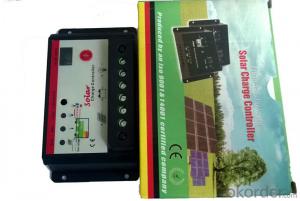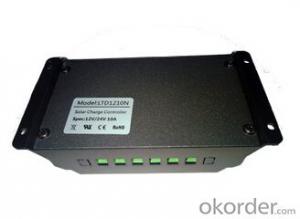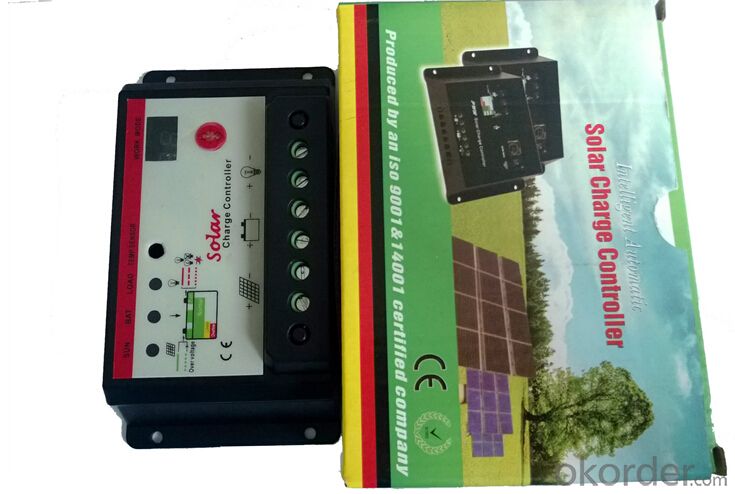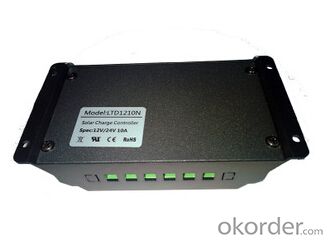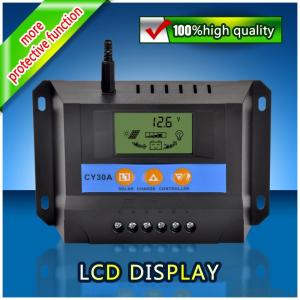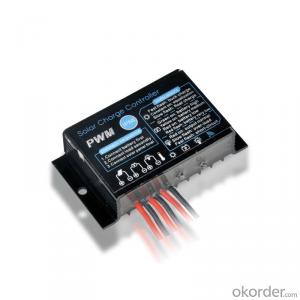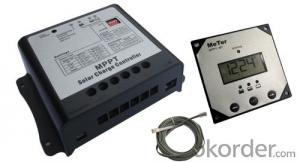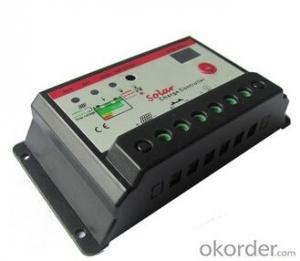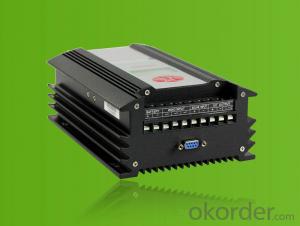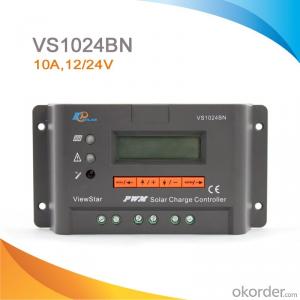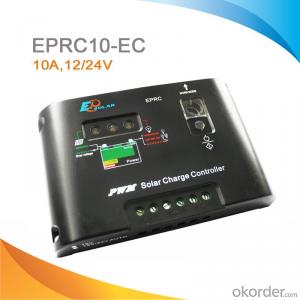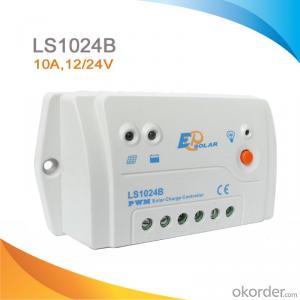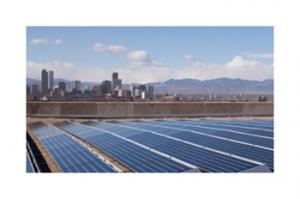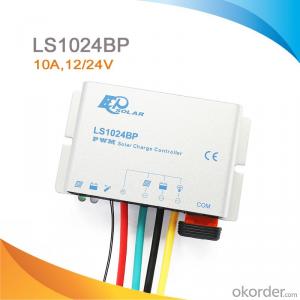2 Solar Charge Controllers in Parallel for Street Light System - Bygd SC1024S
- Loading Port:
- Shanghai
- Payment Terms:
- TT OR LC
- Min Order Qty:
- 10 unit
- Supply Capability:
- 50 unit/month
OKorder Service Pledge
OKorder Financial Service
You Might Also Like
1. Structure of BYGD Solar Charger Controller for Street light system Model SC1024S
This Solar Charger Controller is designed for street light system, which is updated with new technology to realize intelligentialization of control mode, and prolong service lifetime of all the components by improving the efficiency of operation. This Model is prior to the old generation in the aspects as follows: 12V/24V automatical adaption, control and set button changed into tact key, larger contact terminal can offer wire of 6 m2.
2. Main Features of BYGD Solar Charger Controllerfor Street light system Model SC1024S
◆ double LED digital display, clear for observation
◆ recharging mode by three phases
◆ PWM pulse modulated recharging technology
◆set light-dependent control and 1-13hous time control
◆short circuit protection, overvoltage protection, overcurrent protection and lighting protection
◆standy current no more than 5mA
3. BYGD Solar Charger Controllerfor Street light system Model SC1024S Images
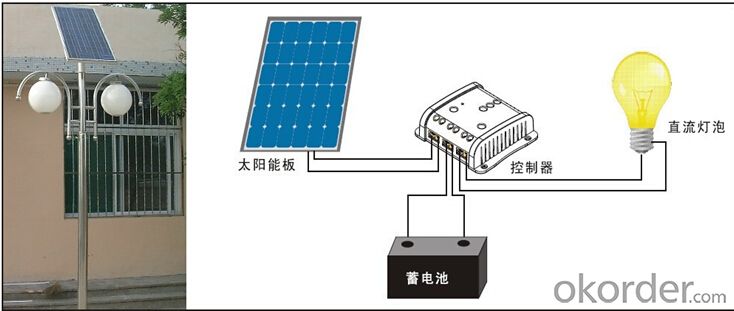
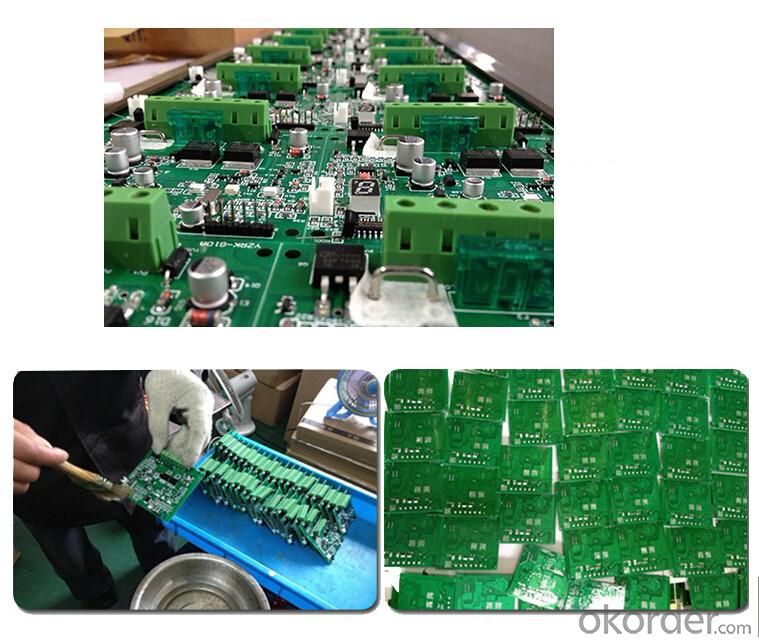
4.BYGD Solar Charger Controllerfor Street light system Model SC1024S Specification
External Size:133mm×70mm
Mounting hole Size:126mm×50mm
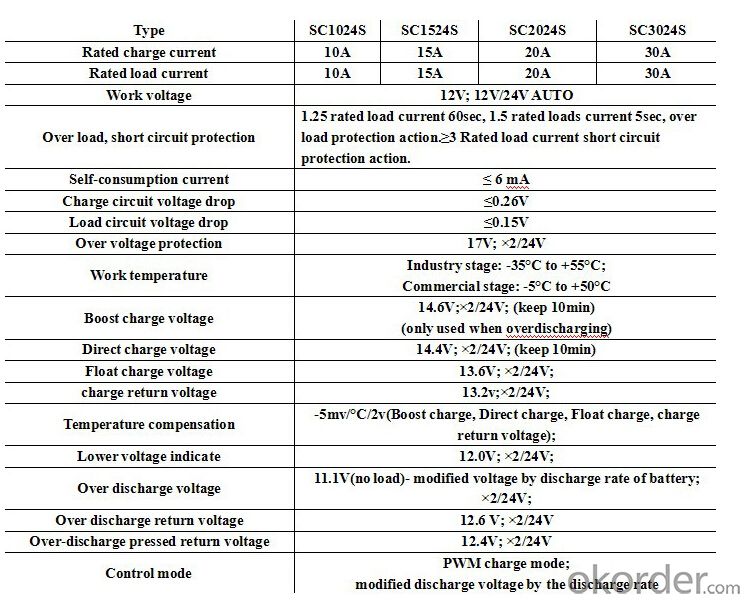
5. FAQ
(1) Why use PWM charge mode?
Our solar charger controller uses PWM in the main circuit for charge in order to reduce the voltage loss of the loop, which can improve the charging efficiency by 3-6% compared to the ones not useing PWM.
(2) What is the advantage of double digital display?
Double digital display make the code more clear and reasonable to show the correct mode so as to avoid misunderstanding.
(3)Is this new model more expensive that the old one?
Surely yes, because new model has the terminal bigger than that of the old model, which costs a few times more, the price of the product will be increased accrodingly.
- Q: Can a solar controller be used with a solar-powered hospitality industry?
- Yes, a solar controller can be used with a solar-powered hospitality industry. A solar controller is essential in managing and regulating the flow of electricity from solar panels to the various components of a solar-powered system. In the hospitality industry, solar controllers can be used to efficiently charge and maintain batteries, power lighting and heating systems, operate appliances, and manage overall energy usage. By using a solar controller, the hospitality industry can effectively harness and utilize solar energy to reduce electricity costs and promote sustainability.
- Q: Can a solar controller be used with different types of solar panel cleaning systems?
- Yes, a solar controller can be used with different types of solar panel cleaning systems. A solar controller is designed to regulate and optimize the charging and discharging of batteries in a solar power system. It helps regulate the flow of electricity from the solar panels to the batteries, ensuring that they are charged efficiently and safely. The type of solar panel cleaning system used does not directly affect the functioning of the solar controller. The controller's main purpose is to manage the flow of electricity, and it does not have any specific compatibility requirements with different cleaning systems. However, it is important to note that the solar controller should be compatible with the overall solar power system and the specific cleaning system being used. This means that the controller should be able to handle the voltage and current requirements of the solar panels and the cleaning system. It is recommended to consult the manufacturer's specifications and guidelines to ensure that the solar controller is suitable for the specific cleaning system being used.
- Q: Can a solar controller be used with a portable solar panel setup?
- Yes, a solar controller can be used with a portable solar panel setup. A solar controller helps regulate the flow of electricity from the solar panels to the batteries, preventing overcharging and optimizing the charging process. It is especially useful in portable setups to ensure efficient and safe charging of batteries.
- Q: How does a solar controller handle short-circuit or overload conditions?
- A solar controller is designed to handle short-circuit or overload conditions in order to protect the solar panel system from damage. When a short-circuit or overload occurs, the solar controller employs various mechanisms to ensure the safety and proper functioning of the system. Firstly, the solar controller typically incorporates a built-in fuse or circuit breaker. This acts as a protective device that interrupts the flow of current when it exceeds a specific threshold. In the event of a short-circuit or overload, the fuse or circuit breaker will automatically trip, effectively cutting off the power supply and preventing further damage to the solar controller and connected equipment. Additionally, a solar controller may utilize advanced electronic circuitry to detect short-circuit or overload conditions. These circuits constantly monitor the current flowing through the system and compare it to predefined limits. If the current exceeds the specified limits, the controller will immediately take action to mitigate the situation. One common approach used by solar controllers is pulse width modulation (PWM) or maximum power point tracking (MPPT). These techniques dynamically adjust the output voltage and current of the solar panel to optimize power transfer while preventing excessive current flow. In case of a short-circuit or overload, the solar controller will adjust the output in real-time to ensure that the current remains within safe limits. Furthermore, modern solar controllers often feature various protection features such as overvoltage protection, reverse polarity protection, and temperature compensation. These additional safeguards further enhance the controller's ability to handle short-circuit or overload conditions by preventing potential issues that could arise from these scenarios. Overall, a solar controller employs a combination of protective devices, electronic circuitry, and advanced control techniques to handle short-circuit or overload conditions. By promptly detecting and responding to these situations, the solar controller ensures the safe and efficient operation of the solar panel system, safeguarding both the equipment and the integrity of the power supply.
- Q: What is the discharge current rating of a solar controller?
- The discharge current rating of a solar controller refers to the maximum amount of current that can be drawn from the controller's battery bank to power devices or appliances. This rating is typically specified by the manufacturer and can vary depending on the model and capacity of the solar controller.
- Q: Can a solar controller be used with a solar-powered signage system?
- Yes, a solar controller can be used with a solar-powered signage system. A solar controller is responsible for regulating the charging and discharging of batteries in a solar-powered system. In the case of a solar-powered signage system, the solar controller will help optimize the energy generated by the solar panels and ensure that the batteries are charged efficiently. It will also protect the batteries from overcharging or discharging, extending their lifespan and maintaining the reliability of the signage system.
- Q: What is the cost of a solar controller?
- The cost of a solar controller can vary depending on several factors such as brand, capacity, features, and quality. On average, a basic solar controller can range from $20 to $50, while more advanced models with additional functionalities can cost anywhere from $50 to $200 or more.
- Q: What is the maximum current rating for a solar controller?
- The solar controller's maximum current rating is determined by its design and the specific model. Typically, solar controllers come in various current ratings to suit different solar panel configurations and system needs. Manufacturers usually mention the maximum current rating in the product specifications. It is crucial to choose a solar controller capable of handling the highest current generated by your solar panels to guarantee both efficient and secure operation.
- Q: What is the typical standby power consumption of a solar controller?
- The standby power consumption of a solar controller can vary depending on the specific model and brand, but most modern controllers have a very low standby power consumption. On average, these controllers consume as little as 0.1 watts to about 1 watt when not actively controlling the solar system. Efficient design and advanced power-saving technologies enable these controllers to achieve such low standby power consumption. They are designed to minimize energy waste and only use a minimal amount of power when not actively controlling the solar system. It is important to consider that standby power consumption may also be influenced by factors like the size of the solar system, the complexity of the controller's features, and any additional accessories connected to the controller. Thus, it is always advisable to consult the manufacturer's product specifications for accurate information on the standby power consumption of a specific solar controller.
- Q: Can a solar controller be used with solar-powered indoor office buildings?
- Yes, a solar controller can be used with solar-powered indoor office buildings. A solar controller is an essential component of a solar power system as it helps regulate and optimize the charging and discharging of batteries and ensures the efficient utilization of solar energy. In the case of solar-powered indoor office buildings, the solar controller would play a crucial role in managing the flow of solar power from the solar panels to the batteries, and then to power the electrical equipment and lighting within the building. It would also help monitor and control the charging and discharging rates to maintain the batteries' health and longevity. Therefore, a solar controller is an integral part of the system that enables the efficient operation of solar-powered indoor office buildings.
Send your message to us
2 Solar Charge Controllers in Parallel for Street Light System - Bygd SC1024S
- Loading Port:
- Shanghai
- Payment Terms:
- TT OR LC
- Min Order Qty:
- 10 unit
- Supply Capability:
- 50 unit/month
OKorder Service Pledge
OKorder Financial Service
Similar products
Hot products
Hot Searches
Related keywords
